| SHADOWS ON THE WALL | REVIEWS | NEWS | FESTIVAL | AWARDS | Q&A | ABOUT | TALKBACK | |||||
 Shadows off the beaten path Shadows off the beaten pathIndies, foreigns, docs, revivals and shorts...
On this page:
BACURAU |
THE PAINTED BIRD |
PORTRAIT OF A LADY ON FIRE
| |||||
| See also: SHADOWS FILM FESTIVAL | Last update 9.Oct.19 | |||||
|
Bacurau Review by Rich Cline | 
| |||||
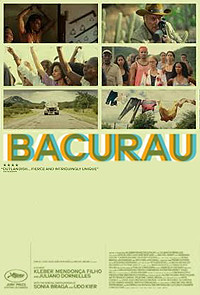 dir-scr Kleber Mendonca Filho, Juliano Dornelles prd Said Ben Said, Emilie Lesclaux, Michel Merkt with Barbara Colen, Thomas Aquino, Sonia Braga, Udo Kier, Silvero Pereira, Thardelly Lima, Rubens Santos, Wilson Rabelo, Karine Teles, Antonio Saboia, Carlos Francisco, Luciana Souza release Br 29.Aug.19, UK Oct.19 lff, US Oct.19 nyff 19/Brazil 2h11 CANNES FILM FEST TORONTO FILM FEST  |
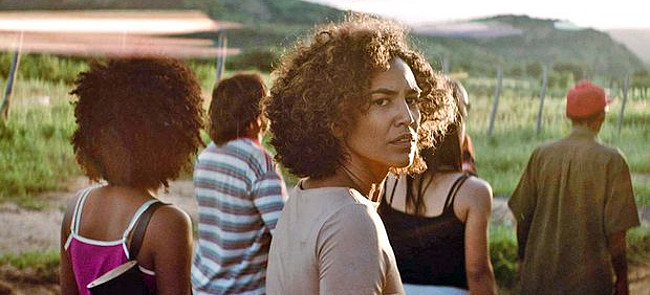 A staggering exploration of Brazil's past and present, this darkly satirical fable is witty, engaging and deeply disturbing. Filmmakers Kleber Mendonca Filho and Juliano Dornelles capture the matter-of-fact rhythms of a close community while also unflinchingly tapping into the violent impulses that come both within and from outside. And while there is a continual stream of humour, it's the violence that lingers. Mainly because of what it means. Leaving the city, Teresa (Colen) heads to her isolated hometown Bacurau for her grandmother's funeral. Everyone knows notorious outlaw Lunga (Pereira) is hiding nearby, but they ignore the national manhunt because he's one of them. They also ignore grandstanding mayor Tony Jr (Lima) when he promises to give them food and medicine, because he has diverted their water supply. When residents on a nearby farm are mysteriously murdered, and two tourists (Teles and Saboia) arrive on dirt-bikes, the villagers know something is up. But this place has a history of fending off attacks. Events feel quirky and offbeat, even when they're awful. At one point, the schoolteacher (Rabelo) is puzzled that Bacurau has vanished from the map, and when the bikers come through there's a shift in perspective to a group of foreigners led by a German (Kier) playing some sort of game involving hunting humans. Their idea is to literally wipe this town off the map. But the villagers are feistier than they expect, especially when they bring Lunga back to help bolster their defence. The actors are all terrific, as the community loves their life outside the chaos of Brazil's political turmoil. And their museum documents that this feistiness isn't something new. Colen and Aquino, in the central roles as old friends and lovers, are terrific. And Braga is fabulous as always as the local doctor, a complex and somewhat unpredictable woman. Each person in this story, villagers and interlopers, has a vivid personality that often adds big laughs to the film. And some of these laughs are very bitter indeed. While the filmmakers and cast maintain a breezily madcap tone, the story is dark and provocative, exploring massive issues including the lingering, strangling effects of colonialism, capitalism and corruption. These things don't only happen in Brazil, of course, so it's eerily easy for the audience to identify with the pressures that are put upon these normal, resourceful people. And it's perhaps too much fun to root for them when they put up a fight.
| ||||
|
The Painted Bird Review by Rich Cline | 
| |||||
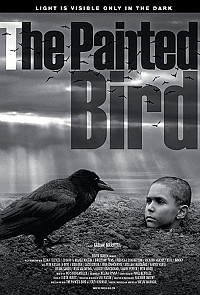 dir-scr Vaclav Marhoul prd Aleksandr Kushaev, Vaclav Marhoul with Petr Kotlar, Harvey Keitel, Barry Pepper, Udo Kier, Stellan Skarsgard, Julian Sands, Julia Valentova, Ala Sakalova, Lech Dyblik, Jitka Cvancarova, Nina Sunevic, Petr Vanek release Cz 2.Sep.19, UK Oct.19 lff, US Oct.19 ciff 19/Czech Republic 2h49 VENICE FILM FEST TORONTO FILM FEST  |
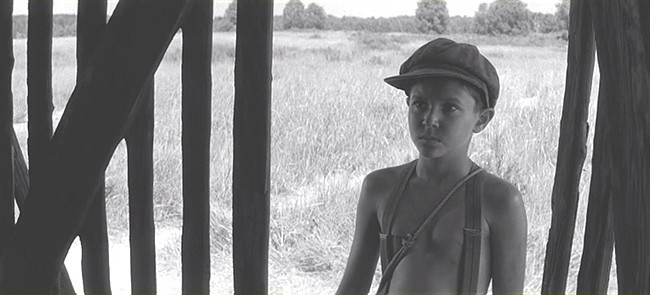 Based on the Jerzy Kosinski novel, this sprawling Czech epic takes the audience in an unforgettable odyssey through World War II. Shot in shimmering black and white, scenes look exquisite, giving the film an instantly classic tone. Each episode of this allegory carries an unexpected kick as it reflects real life in bracingly full-on ways. Writer-director Vaclav Marhoul keeps the explicit stuff off-camera, but he still leaves us shaken. In a tiny village, a young boy (Kotlar) is alone after his Aunt (Sunevic) dies suddenly, leaving him at the mercy of superstitious locals. Medicine woman Olga (Sakalova) takes him in, the first stop on a journey that includes a jealous miller (Kier), a birdkeeper (Dyblik) and the prostitute (Cvancarova) he loves, a kindly priest (Keitel) with an abusive parishioner (Sands), and an oversexed woman (Valentova) with no boundaries. Eventually he falls into the hands of a German officer (Skarsgard), then a liberating Russian sniper (Pepper) who believes in taking an eye for an eye. The way this story progresses is genuinely harrowing, as this boy's humanity is stripped from him step-by-step, leaving him as a hollow shell who can't quite remember his name. Scenes unfold with minimal dialog, which effectively means that many characters are mute. And Vladimir Smutny's camerawork is beautiful, capturing the visceral interaction between people and places. All of which gives the film an elemental vibe, cutting through polite society to reveal the shocking truth underneath. Mercifully, the final scenes offer a hint of hope. The remarkable Kotlar delivers an expressive, mostly wordless performance that's seriously demanding. Not only is he in virtually every scene, but he endures a staggering range of violence, emotion and indignity. Throughout, he maintains the boy's observant stare, soaking everything in whether he wants to or not, carrying the viewer with him through the most unthinkable moments. The people he meets along the way are played with earthy honesty as well, never flinching from the complex layers of inhumanity their characters display. There's definitely a sense that this young boy is symbolically traversing the Czech Republic's entire 20th century history over the course of this movie, which adds a perhaps frightening depth of meaning to even the most provocatively outrageous sequences. This certainly isn't a film for the faint of heart, but for those who are tough enough to face up to the cruel course of human events, the film offers both caution and a promise of healing.
| ||||
|
Portrait of a Lady on Fire Portrait de la Jeune Fille en Feu Review by Rich Cline |  MUST
MUST  SEE SEE
| |||||
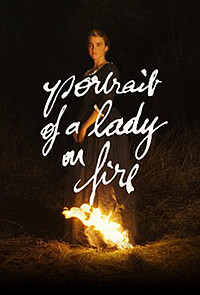 dir-scr Celine Sciamma prd Veronique Cayla, Benedicte Couvreur with Noemie Merlant, Adele Haenel, Luana Bajrami, Valeria Golino, Christel Baras, Armande Boulanger, Guy Delamarche, Clement Bouyssou, Michele Clement, Cecile Morel release Fr 18.Sep.19, US 6.Dec.19, UK 28.Feb.20 19/France 1h59
TORONTO FILM FEST  |
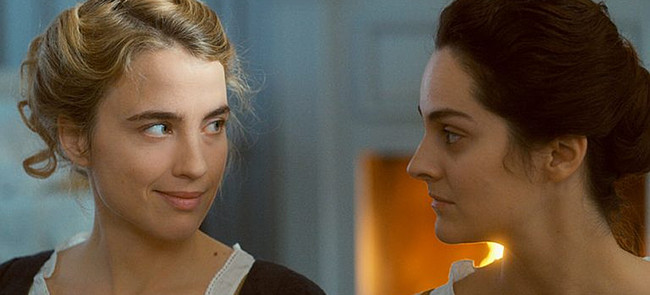 With a staggeringly astute screenplay and sharply observant direction, French filmmaker Celine Sciamma breathes inventive life into this period drama. She fills scenes to the brim with subtext, and not only mines her richly layered story for resonant themes but also creates complex characters the audience can fall in love with. So the film's otherworldly beauty becomes a provocative depiction of both art and romance. In the 18th century, second-generation painter Marianne (Merlant) arrives by boat at an isolated manor. She's been commissioned to paint a portrait of Heloise (Haenel) for her wedding, but is instructed by her mother the Comtesse (Golino) to do it secretly, simply being a companion to Heloise. As they talk, Marianne discovers Heloise's anger at being forced to marry a stranger. And she's still grieving the death of her sister. Over the coming days, Marianne and Heloise become close, helping housemaid Sophie (Bajrami) with a personal issue while comparing views on music, painting and love. All four women are fascinating, each caught within this society in her own way. Essentially powerless, they try to control slivers of their lives. Sciamma reveals details in throwaway lines or observant camera angles, plus various glances, jokes and pangs of vivid emotion. Even Marianne's work on the portrait has layers of meaning, as does the film's intriguing title. And each scene is simply gorgeous, from the faded rooms lit by candles to the rugged beaches where Heloise longs to discover if she can swim. Merlant and Haenel deliver wonderfully shaded performances underscored with brittle wit and seriously deep feelings. As they tentatively reveal their mutual attraction, they become more openly charming, yet still on guard. Marianne is free to choose her future, while Heloise isn't. Meanwhile, Bajrani brings the same riveting layers to Sophie, who is constrained and also liberated by her lower class life. And things aren't that great higher up either, as Golino quietly explores in the Comtesse. This is a rare film that takes the breath away with moments of transcendent beauty. Conversations get deeper and more revealing as the story grows, using firelight and music to add unexpected textures. It's assembled to draw the audience into a story that feels almost mythical, set just outside the rules of society. This makes the themes feel timeless, for example exploring if it's better to keep the person or the memory of them. And whether all lovers feel like they're inventing something brand new.
| ||||

See also: SHADOWS FILM FESTIVAL © 2019 by Rich Cline, Shadows
on the Wall
HOME | REVIEWS | NEWS | FESTIVAL | AWARDS
| Q&A | ABOUT | TALKBACK | | ||||


